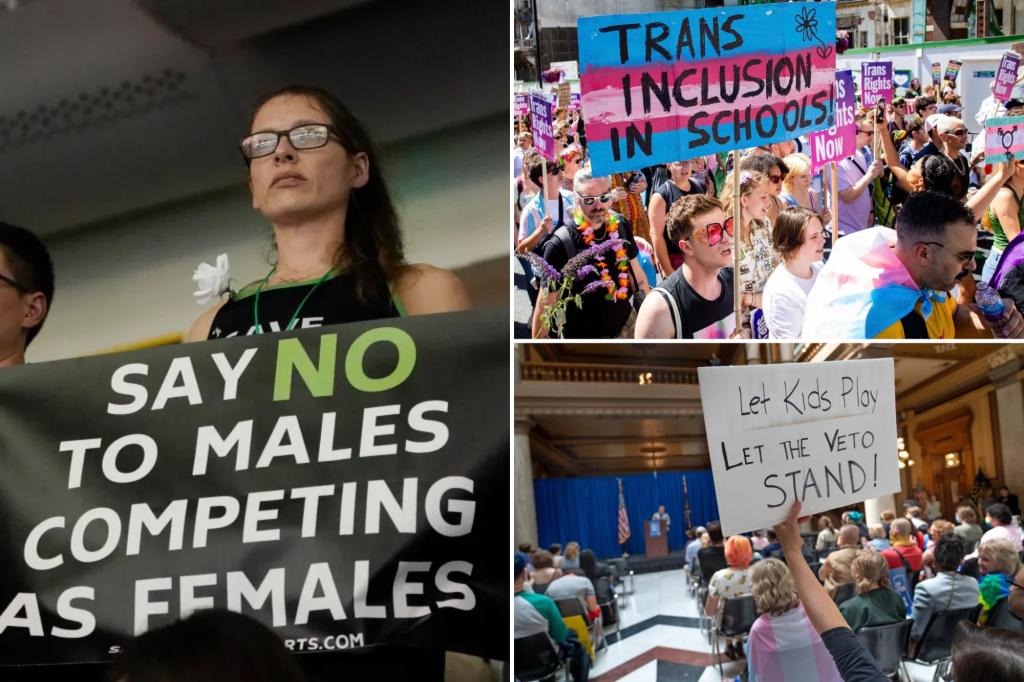The debate surrounding the inclusion of transgender women in women’s sports has intensified in recent years, culminating in widespread public opposition and legislative action. A recent New York Times/Ipsos poll reveals a significant majority of Americans, including a substantial portion of Democrats, believe transgender women should not be allowed to compete in women’s sports. This sentiment transcends party lines, with 79% of overall respondents expressing disapproval. While Republicans overwhelmingly oppose such inclusion (94%), a notable 67% of Democrats share this view. This broad-based opposition underscores the growing societal concern regarding fairness and competitive balance in women’s sports. The small percentage of respondents who declined to answer suggests a potential hesitancy to engage with this complex and sensitive issue, particularly among Democrats.
The heightened awareness and opposition to transgender women participating in women’s sports gained significant traction in 2024, becoming a prominent campaign issue during the presidential election. This elevated focus contributed to the issue’s prominence in public discourse and its subsequent impact on policy discussions. The Concerned Women for America (CWA) exit poll further substantiates the issue’s political weight, indicating that a majority of moderate voters considered then-candidate Trump’s stance on transgender athletes in women’s sports as a significant factor in their voting decisions. The issue resonated strongly with voters, with a significant portion deeming it either “very important” or the “most important” issue. This underscores the issue’s potency in mobilizing voters and influencing election outcomes.
Public opinion polls consistently demonstrate a strong and consistent resistance to the inclusion of transgender women in women’s sports. A Gallup poll from last year revealed that nearly 70% of Americans oppose allowing biological males to compete in women’s sports, mirroring the findings of the New York Times/Ipsos poll. This consistent opposition across multiple polls highlights the widespread nature of this sentiment and its entrenchment in public opinion. A separate survey conducted by NORC at the University of Chicago further solidifies this opposition, with a majority of respondents expressing disapproval of transgender athletes competing in sports aligned with their gender identity rather than their biological sex. This opposition further intensifies when specifically addressing transgender women in women’s sports, rising to 69% disapproval. The consistency of these findings across different surveys and demographics reinforces the widespread nature of the opposition and its potential impact on policy decisions.
The converging data from these various polls underscores a compelling narrative: public opinion firmly opposes the inclusion of transgender women in women’s sports. This sentiment transcends political affiliations and reflects a broad-based concern about preserving fair competition and protecting women’s sports. The data suggests a disconnect between the advocacy for inclusion by some activist groups and the prevailing public sentiment, which favors maintaining separate categories for male and female athletes based on biological sex. The consistent opposition across multiple polls conducted by different organizations strengthens the validity of this observation and its implications for policy-making.
The political landscape is now reflecting this public sentiment, with the Republican-led House of Representatives passing the Protection of Women and Girls in Sports Act. This legislation aims to restrict transgender women’s participation in women’s sports, aligning with the prevailing public opinion and signaling a shift towards legislative action on this contentious issue. The bill’s bipartisan support, albeit minimal, suggests a potential for broader consensus on this issue than previously anticipated. The bill’s passage in the House and its expected consideration by the Republican-controlled Senate further underscores the momentum behind this legislative effort. With the prospect of then-President-elect Trump signing the bill into law, it signifies a potential turning point in the debate and the formalization of restrictions on transgender athletes in women’s sports at the federal level.
The convergence of public opinion, political action, and upcoming legislation signifies a significant juncture in the debate surrounding transgender women in sports. The consistent and overwhelming opposition revealed by multiple polls provides a strong mandate for lawmakers to address this issue, reflecting the public’s desire to preserve fair competition and protect women’s sports. The passage of the Protection of Women and Girls in Sports Act through the House represents a concrete step towards enacting legislation that aligns with this widespread public sentiment. The upcoming Senate vote and the potential for presidential approval signal the potential for significant changes in the landscape of women’s sports, potentially setting a precedent for future legislation and legal challenges related to transgender athletes. The overall trend suggests a move towards codifying restrictions on transgender women’s participation in women’s sports, which raises complex questions about inclusivity, fairness, and the evolving understanding of gender identity in the context of athletic competition.

